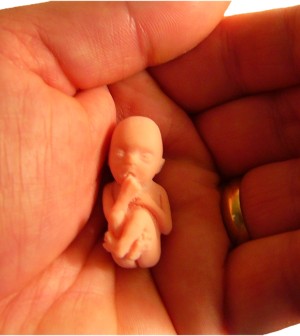- Could Your Grocery Store Meat Be Causing Recurring UTIs?
- Are You Making This Expensive Thermostat Error This Winter?
- Recognizing the Signs of Hypothyroidism
- 10 Strategies to Overcome Insomnia
- Could Artificial Sweeteners Be Aging the Brain Faster?
- Techniques for Soothing Your Nervous System
- Does the Water in Your House Smell Funny? Here’s Why
- Can a Daily Dose of Apple Cider Vinegar Actually Aid Weight Loss?
- 6 Health Beverages That Can Actually Spike Your Blood Sugar
- Treatment Options for Social Anxiety Disorder
Numbing Medications Can Harm Teething Babies, FDA Warns


Teething infants can come to serious harm or even death from certain “gum-numbing” medications, according to a new warning from the U.S. Food and Drug Administration.
The agency said Wednesday that local anesthetics known as viscous lidocaine, or benzocaine-containing teething products, should never be used for teething children, except under the advice and supervision of a health care professional.
Viscous lidocaine contains a local anesthetic in a gel-like syrup. It requires a prescription and is typically used to treat mouth ulcers that can occur in patients undergoing chemotherapy. Parents who happen to have viscous lidocaine on hand may be tempted to use it to help teething babies, but they should not do so, the FDA said in a news release.
There have been reports of teething babies suffering overdoses of viscous lidocaine, according to the Institute for Safe Medication Practices. The FDA noted that in 2014 it received 22 reports of serious incidents, including deaths, tied to use of viscous lidocaine in babies and toddlers under three and a half years of age.
According to the agency, symptoms of overdosing include confusion, jitteriness, shaking, seizures, falling asleep too easily, vision problems and vomiting.
The FDA now requires a warning on the label of all prescription oral viscous lidocaine cautioning against its use in babies and small children for teething pain.
Viscous lidocaine also “can make swallowing difficult and can increase the risk of choking or breathing in food. It can lead to drug toxicity and affect the heart and nervous system,” Michael Cohen, ISMP president, said in the FDA news release.
The FDA also said that over-the-counter benzocaine products should not be used for children younger than age 2. These products include Anbesol, Hurricaine, Orajel, Baby Orajel and Orabase.
Benzocaine products for mouth and gum pain can cause a rare but serious and potentially fatal condition called methemoglobinemia, a disorder in which the amount of oxygen carried through the blood stream is greatly reduced. Children under age 2 are at particular risk, the FDA said.
In the end, parents may simply have to accept teething as an uncomfortable but transient part of infancy, experts said.
“Teething is a normal phenomenon; all babies teethe,” Dr. Ethan Hausman, a pediatrician and pathologist at the FDA, said in the news release. He added that the agency “does not recommend any sort of drug, herbal or homeopathic medication or therapy for teething in children.”
If a child has swollen and tender gums, you can gently massage them with your finger and give the child a cool teething ring or a clean, wet, cool washcloth to chew on, the FDA said.
“The cool object acts like a very mild local anesthetic,” Dr. Hari Cheryl Sachs, a pediatrician at the FDA, said in the news release. “This is a great relief for children for a short time.”
More information
The U.S. National Library of Medicine has more about teething.
Source: HealthDay
Copyright © 2026 HealthDay. All rights reserved.










